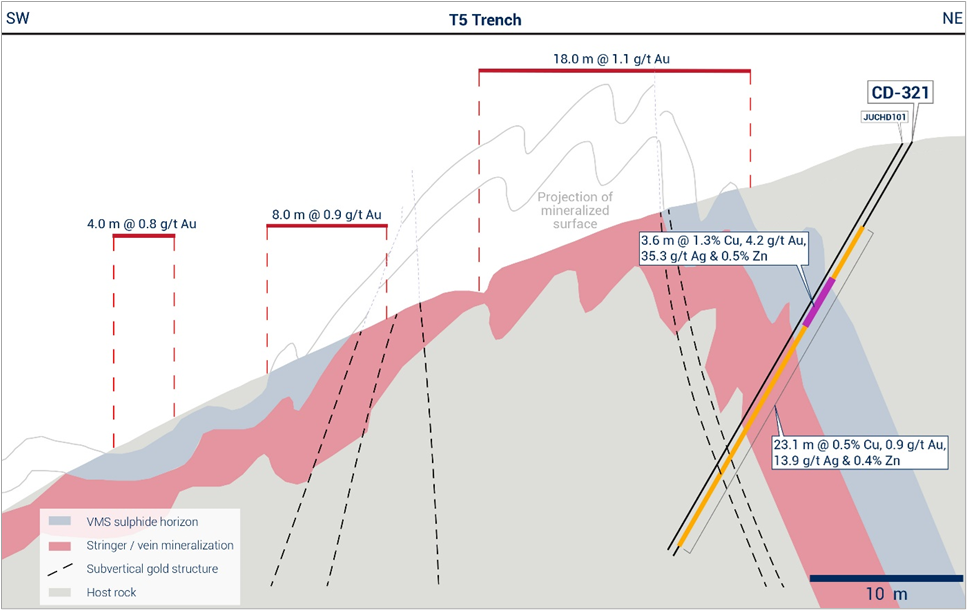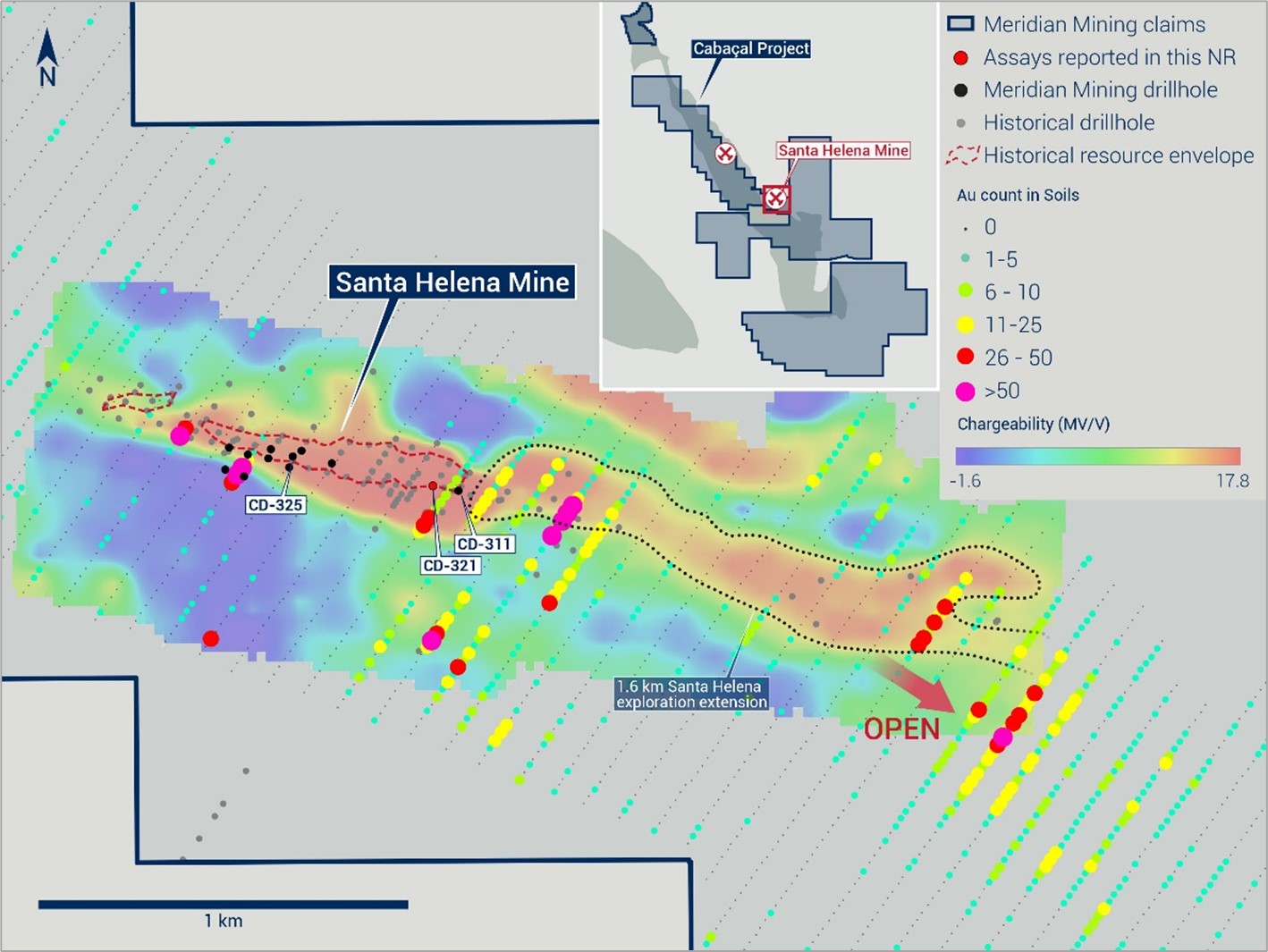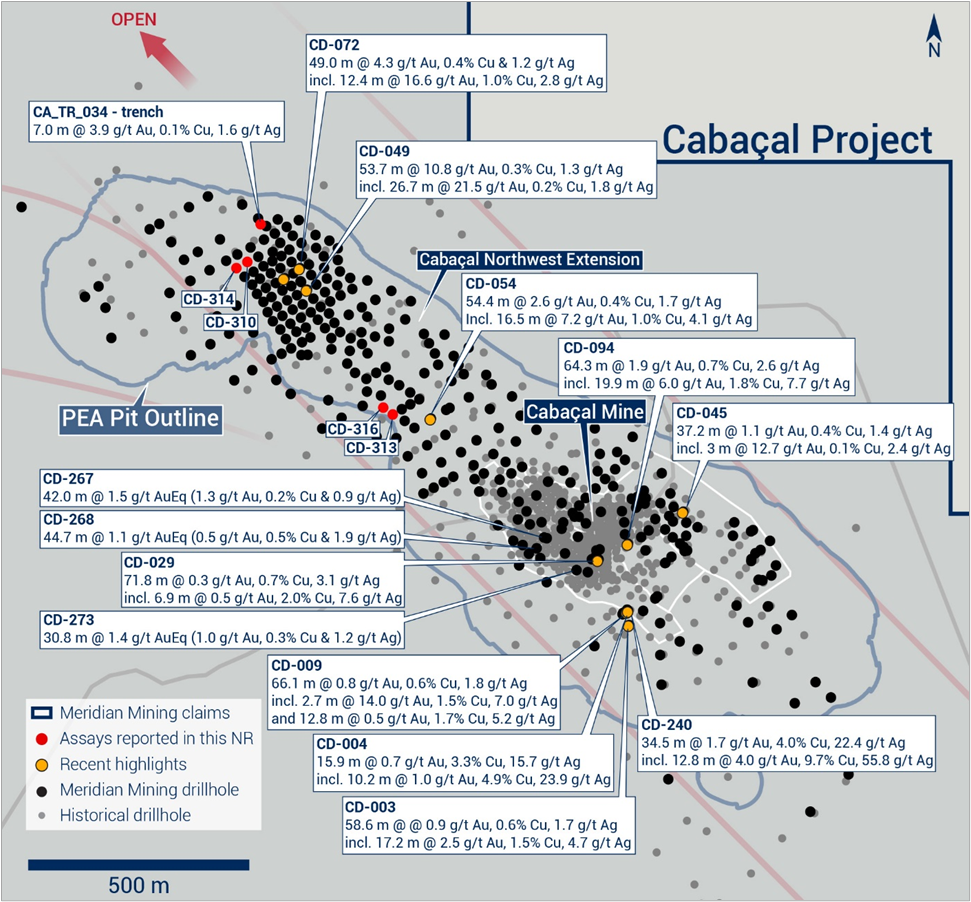from Meridian Mining UK S (isin : GB00BN4LHY20)
Meridian Confirms High-Grade Gold at Santa Helena
Santa Helena's resource delineation and exploration drill program to be doubled
LONDON, UK / ACCESSWIRE / September 27, 2023 / Meridian Mining UK S (TSX:MNO)(OTCQX:MRRDF)(Frankfurt/Tradegate:2MM) ("Meridian" or the "Company") is pleased to report further strong near-surface results at the Santa Helena copper, gold, silver and zinc mine ("Santa Helena"), with CD-321 returning a high-grade gold zone grading 3.6m @ 1.3% Cu, 4.2g/t Au, 35.3g/t Ag & 0.5% Zn from 10.0m within a broader interval of 23.1m @ 0.5% Cu, 0.9g/t Au, 13.9g/t Ag and 0.4% Zn from 6.1m, ("Figure 1"). Assay grades are again characteristic of gold enrichment superimposed on the Cabaçal VMS Belt. The Company is also reporting that Santa Helena's southeast trending exploration corridor's footprint has been extended by 500m to at least 1.6km ("Figure 2"), projecting to a strong gold-copper anomaly. Based on these strong results, Meridian has committed to doubling the current program to test the considerable potential.
Meridian is also reporting that a zone of strong gold mineralization has been defined at surface at the Cabaçal Mine's Northwest Extension ("CNWE"). Recent trenching returned a result of 7.0m @ 4.0g/t AuEq, ("Figure 3") highlighting the presence of high-grade mineralization easily accessible to the first-year open pit development schedule1. Further results are pending.
Highlights Reported Today
- Shallow high-grade gold confirmed at the Santa Helena Cu-Au-Ag & Zn mine;
- Santa Helena returns near surface high-grade gold and base metal mineralization;
- CD-321: 23.1m @ 0.5% Cu, 0.9g/t Au, 13.9g/t Ag & 0.4% Zn) from 6.1m; Including
- 3.6m @ 1.3% Cu, 4.2g/t Au, 35.3g/t Ag & 0.5% Zn) from 10.0m;
- CD-321: 23.1m @ 0.5% Cu, 0.9g/t Au, 13.9g/t Ag & 0.4% Zn) from 6.1m; Including
- Santa Helena's prospective southeast trending exploration corridor, extended by 500m to 1.6km with survey ongoing;
- Meridian to extend Santa Helena drill program targeting poorly tested upside;
- Cabaçal program continues to deliver strong ongoing Cu-Au-Ag results:
- CA_TR_034: 7.0m @ 4.0g/t AuEq (3.9g/t Au, 0.1% Cu & 1.6g/t Ag);
- Result emphasises the presence of high-grade mineralization easily accessible to surface open pit development; and
- Cabaçal's PEA and resource upgrades progressing well.
True width is considered to be 80 to 90% of intersection width.
Mr. Gilbert Clark, CEO, comments: "The Company is very pleased to confirm with this latest intersection that Santa Helena displays all of the hallmarks of a gold-enriched VMS system, creating a great opportunity to repeat the success in resource growth that we saw in the Cabaçal deposit. Santa Helena's near mine exploration upside has also been extended out to at least 1.6km beyond the historical resource limits, with the geophysical anomaly now shown to coincide with an eastern copper-gold anomaly, enhancing the potential for further discovery. The Cabaçal VMS belt hosts numerous copper-gold and gold-only prospects, with the gold overprint interpreted to be sourced from the underlying tonalite intrusion. This largely untested exploration upside in the belt is underpinned by the robust economics of the Cabaçal Mine's PEA. We see this combination as the logical fit of our dual track development and exploration strategy with Meridian emerging as Brazil's near-term copper-gold mine developer."
Santa Helena Drill Program
Santa Helena is a Cu-Au-Ag & Zn deposit located ~9km to the southeast of the Cabaçal Mine area. It has over 10,000m of historical drilling and is one of a series of exploration targets along the Mine Corridor. The Company commenced initial drilling in August 2023 as part of a verification program, to validate the historical data in line with 43-101 requirements, and to initiate scout drilling for resource extensions defined by geophysics. The Company's compilation of historical drill data indicated that many historical holes were not completely sampled, that reconciliation of surveyed drilled positions and past mine workings suggested that the high-grade massive sulphide mineralization was only partially mined, and that extensions of near-surface mineralization to the east were also not integrated into the historical resource calculations2. The Company has concluded that this historical resource area is considered open.

Figure 1: Cross section through the CD-321 drill site, twinning JUCHD-101, showing wider mineralization envelop than previously interpreted.
The Company has completed 12 holes to date, with the first two reported confirming strong near-surface mineralization: CD-325: 14.9m @ 3.1% CuEq from 26.3m; CD-311: 19.1m @ 1.3% CuEq from 8.0m3.
The latest result ("Table 1") is from a site where historical trenching and drilling was undertaken by BP Minerals, but individual drill assays have been lost. The Company twinned an historical hole, JUCHD-101, which records indicated had returned 18.9m @ 1.3g/t Au from 6.3m (base metal results not analysed). The twin hole, CD-321, returned a broader envelop of gold and base metal mineralization: 23.1m @ 1.0% CuEq (0.5% Cu, 0.9g/t Au, 13.9g/t Ag, 0.4% Zn) from 6.1m, Including 3.6m @ 3.3% CuEq (1.3% Cu, 4.2g/t Au, 35.3g/t Ag, 0.5% Zn) from 10.0m. The hole is below a BP trench (T5) which returned multiple broad gold intersections: 18.0m @ 1.1g/t Au, 8.0m @ 0.9g/t Au, 4.0m @ 0.8g/t Au ("Figure 1"). The position is in a structural domain where the VMS horizon is interpreted to be folded into an anticline, cut by steeper subvertical structures. The Company considers that like the Cabaçal mine area, the gold content of the Santa Helena VMS system has been upgraded by an overprinting event. A belt-scale tonalitic intrusion most likely contributed as a heat engine for this mineralization.
With the new results from CD-321, the Company continues to add data that can be integrated into a resource update, expanding the footprint of near-surface high-grade mineralization.
Following the positive results to the first phase of work, the Company will expand the Santa Helena Program with at least an additional 1000m.
Santa Helena's Expanding near-mine Exploration Corridor
The Company has continued its Gradient Array Induced Polarization survey ("IP survey") over the southeastern extensions to Santa Helena, into the Alamo property. This newly defined chargeability corridor has been extended a further 500m southeastwards, now totaling 1.6km from the limit of Santa Helena's historical resource. The eastern flank of the anomaly aligns with gold and base metal soil anomalies defined in BP surveys, adding valuable context to this target as an extensional corridor for Santa Helena style mineralization.

Figure 2 - Santa Helena plan view and growing 1.6km eastern exploration extension.
The Company considers that the wide spaced historical scout drilling conducted to date along the corridor has not effectively tested the position, in an environment where the VMS horizon is known to be folded, faulted, and subjected to a later-stage high-grade gold-overprint event. The Company is continuing the geophysical and surface mapping programs. Results from further drilling in the vicinity are pending.
Cabaçal Project Development and Resource Definition Program
The Company is also reporting results from CA_TR_034, an infill trench in the Cabaçal Northwest extension and infill drill results ("Table 1"). The trench returned 7.0m @ 0.4g/t AuEq (0.4g/t Au, 0.1% Cu, 0.2g/t Ag) and 7.0m @ 4.0g/t AuEq (3.9g/t Au, 0.1% Cu, 1.6g/t Ag). The result better explains the source of a widespread gold dispersion anomaly and may mark the up-plunge projection of one of the shallow SE plunging high grade lodes intercepted by CD-0494 that returned 26.7m @ 21.5g/t Au ~170m to the southeast. These new strong gold grades at surface would be encompassed by the starter pit scheduled as outlined in the Cabaçal 2023 PEA and show that additional potential zones of shallow mineralization remain to be defined within the open pit resource area.

Figure 3: Location of Cabaçal results reported today.
One of the Company's drill contractors, Sonda Service, is also adapting its equipment to be able to drill low-angle holes (down to 20° dip), and a number of additional holes will be test drilled at Cabaçal in areas where topography places constraints for conventional drill rigs.
Results from further drilling in the vicinity are pending.
About Meridian
Meridian Mining UK S is focused on:
- The development and exploration of the advanced stage Cabaçal VMS goldâcopper project;
- Regional scale exploration of the Cabaçal VMS belt;
- Exploration in the Jaurú & Araputanga Greenstone belts (the above all located in the State of Mato Grosso, Brazil); and
- Exploring the Espigão polymetallic project in the State of Rondônia, Brazil.
Cabaçal is a gold-copper-silver rich VMS deposit with the potential to be a standalone mine within the 50km VMS belt. Cabaçal's base and precious metal-rich mineralization is hosted by volcanogenic type, massive, semi-massive, stringer, and disseminated sulphides within deformed metavolcanic-sedimentary rocks. A later-stage gold overprint event has emplaced high-grade gold mineralization.
The Cabaçal Mineral Resource estimate consists of Indicated resources of 52.9 million tonnes at 0.6g/t gold, 0.3% copper and 1.4g/t silver and Inferred resources of 10.3 million tonnes at 0.7g/t gold, 0.2% copper & 1.1g/t silver (at a 0.3 g/t gold equivalent cut-off grade), including a higher-grade near-surface zone supporting a starter pit.
The Preliminary Economic Assessment technical report (the "PEA Technical Report") dated March 30, 2023, entitled: "Cabaçal Gold-Copper Project NI 43-101 Technical Report and Preliminary Economic Assessment, Mato Grosso, Brazil" outlines a base case after-tax NPV5 of USD 573 million and 58.4% IRR from a pre-production capital cost of USD 180 million, leading to capital repayment in 10.6 months (assuming metals price scenario of USD 1,650 per ounces of gold, USD 3.59 per pound of copper, and USD 21.35 per ounce of silver). Cabaçal has a low All-in-Sustaining-Cost of USD 671 per ounce gold equivalent for the first five years, driven by high metallurgical recovery, a low life-of-mine strip ratio of 2.1:1, and the low operating cost environment of Brazil (see press release dated March 6, 2023).
Readers are encouraged to read the PEA Technical Report in its entirety. The PEA Technical Report may be found on the Company's website at www.meridianminig.co and under the Company's profile on SEDAR+ at https://www.sedarplus.ca.
The qualified persons for the PEA Technical Report are: Robert Raponi (P. Eng), Principal Metallurgist with Ausenco Engineering), Scott Elfen (P. E.), Global Lead Geotechnical and Civil Services with Ausenco Engineering), Simon Tear (PGeo, EurGeol), Principal Geological Consultant of H&SC, Marcelo Batelochi, (MAusIMM, CP Geo), Geological Consultant of MB Geologia Ltda, Joseph Keane (Mineral Processing Engineer; P.E), of SGS, and Guilherme Gomides Ferreira (Mine Engineer MAIG) of GE21 Consultoria Mineral.
On behalf of the Board of Directors of Meridian Mining UK S
Mr. Gilbert Clark
CEO and Director
Meridian Mining UK S
Email: info@meridianmining.net.br
Ph: +1 (778) 715-6410 (PST)
Stay up to date by subscribing for news alerts here: https://meridianmining.co/contact/
Follow Meridian on Twitter: https://twitter.com/MeridianMining
Further information can be found at: www.meridianmining.co
Technical Notes
Samples have been analysed at SGS laboratory in Belo Horizonte. Samples are dried, crushed with 75% passing <3 mm, split to give a mass of 250-300g, pulverized with 95% passing 150#. Gold analyses are conducted by FAA505 (fire assay of a 50g charge), and base metal analysis by methods ICP40B and ICP40B_S (four acid digest with ICP-OES finish). Visible gold intervals are sampled by metallic screen fire assay method MET150-FAASCR. Samples are held in the Company's secure facilities until dispatched and delivered by staff and commercial couriers to the laboratory. Pulps and coarse rejects are retained and returned to the Company for storage. The Company submits a range of quality control samples, including blanks and gold and polymetallic standards supplied by Rocklabs, ITAK and OREAS, supplementing laboratory quality control procedures. Approximately 5% of archived samples are sent for umpire laboratory analysis, including any lots exhibiting QAQC outliers after discussion with the laboratory. In BP Minerals sampling, gold was analysed historically by fire assay and base metals by three acid digest and ICP finish at the Nomos laboratory in Rio de Janeiro. Silver was analysed by aqua regia digest with an atomic absorption finish. True width is considered to be 80-90% of intersection width. Assay figures and intervals are rounded to 1 decimal place. Gold equivalents for Cabaçal are calculated as: AuEq(g/t) = (Au(g/t) * %Recovery) + (1.492*(Cu% * %Recovery)) + (0.013*(Ag(g/t) * %Recovery)), where:
- Au_recovery_ppm = 5.4368ln(Au_Grade_ppm)+88.856
- Cu_recovery_pct = 2.0006ln(Cu_Grade_pct)+94.686
- Ag_recovery_ppm = 13.342ln(Ag_Grade_ppm)+71.037
Recoveries based on 2022 metallurgical testwork on core submitted to SGS Lakefield
Copper equivalents for Santa Helena are based on metallurgical recoveries from the historical resource calculation, updated with pricing forecasts aligned with the Cabaçal PEA. The metal equivalent formula s presented as a copper equivalent rather than a zinc equivalent, based on the Companies current assessment of the metal balance after the past zinc-focussed extraction. CuEq% = (Cu% * 89%Recovery) + (0.67Au(g/t) * 65%Recovery) + (0.318Zn% * 89%Recovery)) + (0.009Ag(g/t) * 61%Recovery)).
The Gradient Array IP survey is being conducted using the Company's in-house team, utilizing its GDD GRx8â16c receiver and 5000Wâ2400â15A transmitter. Data is processed by the Company's independent consultancy Core Geophysics. Geophysical and geochemical exploration targets are preliminary in nature and not conclusive evidence of the likelihood of a mineral deposit.
Qualified Person
Mr. Erich Marques, B.Sc., MAIG, Chief Geologist of Meridian Mining and a Qualified Person as defined by National Instrument 43-101, has reviewed, and verified the technical information in this news release.
FORWARD-LOOKING STATEMENTS
Some statements in this news release contain forward-looking information or forward-looking statements for the purposes of applicable securities laws. These statements address future events and conditions and so involve inherent risks and uncertainties, as disclosed under the heading "Risk Factors" in under the heading "Risk Factors" in Meridian's most recent Annual Information Form filed on https://www.sedarplus.ca/ While these factors and assumptions are considered reasonable by Meridian, in light of management's experience and perception of current conditions and expected developments, Meridian can give no assurance that such expectations will prove to be correct. Any forward-looking statement speaks only as of the date on which it is made and, except as may be required by applicable securities laws, Meridian disclaims any intent or obligation to update any forward-looking statement, whether as a result of new information, future events, or results or otherwise.
Table 1: Results Reported
Santa Helena
Hole-id | Dip | Azi | EOH (m) | Zone | Int (m) | CuEq (g/t) | AuEq (%) | Cu (%) | Au (g/t) | Ag (g/t) | Zn (%) | Pb (%) | From (m) |
CD-321 | -60 | 219 | 31.0 | SHM | |||||||||
23.1 | 1.0 | 1.5 | 0.5 | 0.9 | 13.9 | 0.4 | 0.3 | 6.1 | |||||
Including | 3.6 | 3.3 | 4.9 | 1.3 | 4.2 | 35.3 | 0.5 | 1.1 | 10.0 |
Cabaçal
| Hole-id | Dip | Azi | EOH (m) | Zone | Int (m) | AuEq (g/t) | CuEq (%) | Au (g/t) | Cu (%) | Ag (g/t) | From (m) |
|---|---|---|---|---|---|---|---|---|---|---|---|
CD-316 | 50 | 061 | 85.3 | CWNE | |||||||
3.3 | 0.6 | 0.4 | 0.1 | 0.3 | 2.2 | 56.6 | |||||
CD-314 | 50 | 057 | 71.3 | CWNE | |||||||
21.1 | 0.5 | 0.3 | 0.3 | 0.1 | 0.4 | 35.3 | |||||
CD-313 | 49 | 059 | 100.2 | CWNE | |||||||
3.7 | 0.4 | 0.2 | 0.0 | 0.2 | 0.5 | 20.0 | |||||
2.0 | 1.3 | 0.8 | 0.4 | 0.6 | 2.3 | 38.0 | |||||
1.4 | 0.5 | 0.3 | 0.1 | 0.3 | 1.4 | 48.2 | |||||
CD-310 | 51 | 057 | 66.3 | CWNE | |||||||
4.5 | 0.8 | 0.5 | 0.6 | 0.2 | 0.0 | 23.5 | |||||
17.0 | 0.5 | 0.3 | 0.2 | 0.2 | 1.0 | 33.4 | |||||
CA_TR_035 | 0 | 042 | 43.0 | CWNE | NSI | ||||||
CA_TR_034 | 0 | 056 | 52.0 | CWNE | |||||||
7.0 | 0.4 | 0.3 | 0.4 | 0.1 | 0.2 | 26.0 | |||||

